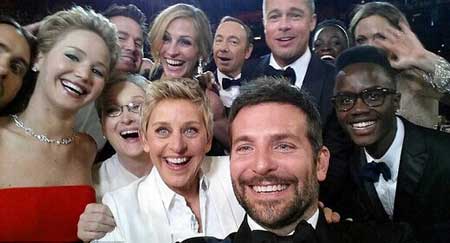
從鼻部整形到拉雙眼皮,整形科醫(yī)師在五花八門(mén)的要求里,感受到患者們對(duì)改頭換面的渴望。
And the driving force? Selfies and the pressure people feel to improve their profile on social media sites.
這背后的動(dòng)力就是自拍和人們迫切想要提升自己在社交網(wǎng)站個(gè)人頁(yè)面形象的壓力。
A poll by the American Academy of Facial Plastic and Reconstructive Surgery found one in three surgeons have seen a rise in requests for procedures as a result of patients being more aware of their image on social media.
美國(guó)醫(yī)學(xué)整容整形學(xué)會(huì)發(fā)布的調(diào)查結(jié)果表明,三分之一的整形科醫(yī)生接受患者咨詢的次數(shù)明顯增加,這都是因?yàn)槿藗冏约涸偕缃幻襟w的形象越來(lái)越在意。
The 2,700 respondents noted a 10 per cent rise in nose jobs, rhinoplasty, in 2013 compared to 2012.
2700名受訪醫(yī)生表示2013年隆鼻等鼻部整形手術(shù)比2012年增長(zhǎng)了10%。
And in that time they said they have seen a seven per cent jump in hair transplants and a six per cent jump in eyelid surgery.
醫(yī)生們表示,同一時(shí)期接受自體毛發(fā)移植手術(shù)的患者增加了6%,與此同時(shí),割雙眼皮的人數(shù)也有6%的增長(zhǎng)。
Dr Sam Rizk, a Manhattan-based plastic surgeon, said: 'There has been a 25 per cent increase over the past year-and-a-half to two years.
來(lái)自曼哈頓的整形科醫(yī)生山姆-瑞茲克(Sam Rizk)表示,在過(guò)去一年半到兩年的時(shí)間里,整容市場(chǎng)有了25%的增長(zhǎng)。
'That is very significant. They come in with their iPhones and show me pictures. Selfies are just getting to be so crazy.'
“這個(gè)趨勢(shì)十分明顯,患者來(lái)診所時(shí)把圖片放在手機(jī)里給我看。自拍照的力量太可怕了。”
But Dr Rizk, who specialises in rhinoplasty, said not everyone who requests surgery needs it because a selfie produces a distorted image that does not represent how a person really looks.
但是擅長(zhǎng)鼻部手術(shù)的瑞茲克醫(yī)生卻稱,并不是每個(gè)來(lái)診所的人都需要手術(shù)。因?yàn)樽耘恼照宫F(xiàn)的形象是失真的,并不能反映一個(gè)人的真實(shí)長(zhǎng)相。
'We all will have something wrong with us on a selfie image,' he said.
他表示:“在自拍照里,我們每個(gè)人都會(huì)有不滿意的地方。”
'I refuse a significant proportion of patients with selfies because I believe it is not a real image of what they actually look like in person.'
“我回絕了大部分帶自拍照來(lái)的患者,因?yàn)槲艺J(rèn)為他們沒(méi)必要做手術(shù),自拍照上的那不是他們真正的樣子。”
Some patients get upset when Dr Rizk tells them surgery is not necessary, and he knows they will simply go to another surgeon.
盡管他們聽(tīng)到瑞茲克醫(yī)生的建議后非常失落,但是他知道,這些患者接下來(lái)都會(huì)另找醫(yī)生做手術(shù)。
'Too many selfies indicate a self obsession and a certain level of insecurity that most teenagers have. It just makes it worse,' he said. 'Now they can see themselves in 100 images a day on Facebook and Instagram.'
“過(guò)多的自拍照反映了時(shí)下青少年共有的自戀和一定程度的不安全感,而這一趨勢(shì)愈演愈烈。現(xiàn)在,他們幾乎每天都在各中社交媒體上傳100張自拍,”瑞茲克醫(yī)生說(shuō)。
New York make-up artist Ramy Gafni, who has worked with clients on selfies and online dating profile photos, suggests using clean makeup, well-defined eyebrows and a bit color on the lips to produce the best selfies.
在紐約工作的化妝師瑞米-蓋福尼,常為客人化出適合拍攝個(gè)人照片的靚麗妝容。他建議,想拍出一張完美的個(gè)人照,應(yīng)該在臉部畫(huà)上淡妝。運(yùn)用精致的眉毛線條和恰到好處的唇色,點(diǎn)亮整個(gè)妝容。
'You want to enhance your features, perfect your features but not necessarily change your features into something they are not,' he said.
他說(shuō):“你希望突出、美化個(gè)人特色,但這不代表你需要改變你本來(lái)的面目。”
(翻譯:菠蘿油八戒 編輯:Helen)
